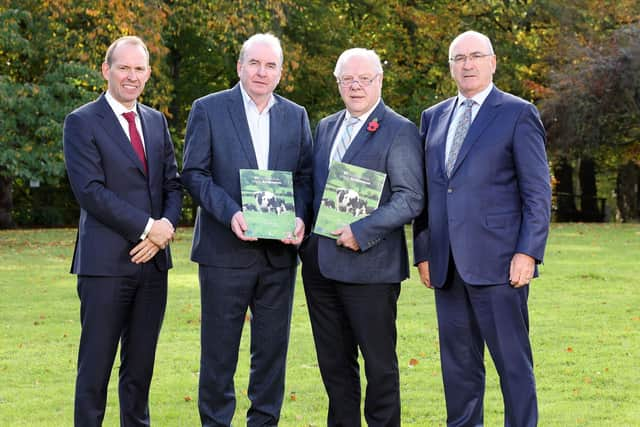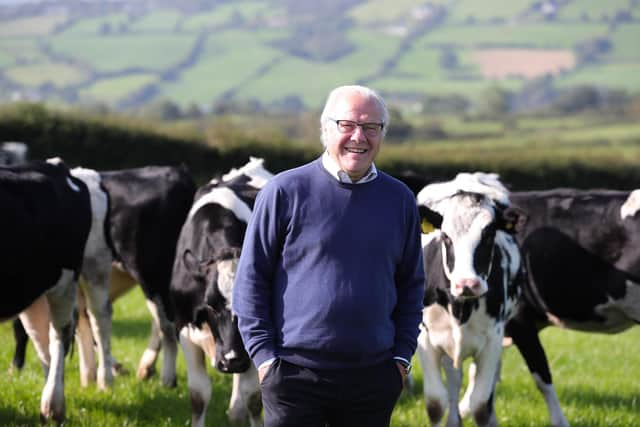Sustainability will underpin Dairy Council agenda throughout 2023 and beyond
and live on Freeview channel 276
He has confirmed that plans to put in place a new sustainability body, representing the interests of the entire agri-food industry, are developing apace.
Dr Johnston added: “The plan is for an industry-led body with the scope to deliver a coherent response to the challenge of climate change, the stretching targets of legislation and the need to retain a viable food production base here in Northern Ireland.
Advertisement
Advertisement
“Establishing a sustainability body will provide Northern Ireland with a competitive advantage and will champion agri-food, and farming in particular, to be key parts of the solutions for longer term twin goals of mitigating climate change and ensuring food security.”


The Dairy Council representative indicated that discussions involving key agri-food sector groups had taken place with the aim of developing a governance structure for the new body.
Mike Johnston continued:“There has been an encouraging response so far across the entire agri food spectrum for the establishment of this new body.
“The plan is that the board will be made up of farmer representatives and people at chief executive level from the various sectors: so the new organisation will operate at a very high level and provide the necessary strategic direction.
Advertisement
Advertisement
"This will be farmers and processors working together in common cause.”


No funding mechanism has, as yet, been agreed for the new organisation.
However, Mike Johnston believes that delivering a range of projects for the Department of Agriculture, Environment and Rural Affairs (DAERA) will be an important part of the business plan moving forward.
He continued:“But, fundamentally, we are talking about an industry body that will be run by industry, for the benefit of industry and funded by industry.
Advertisement
Advertisement
"This will involve the new body liaising with DAERA across a range of issues.
"But it will be very proactive in nature, especially in relation to the industry’s research agenda.
“If we are to achieve the various targets that the NI Climate Change Act has set, and those that our customers are demanding, we will need a lot of new tools in the toolbox in the coming years.
"We have world class research facilities and researchers in Northern Ireland and through the sustainability body industry and research will have the opportunity to come together to develop the tools that will allow our farmers and processors to continue to produce food to the highest quality and lowest carbon footprint,” commented Johnston
Advertisement
Advertisement
“The key to enabling this research will be data, and one of the key roles of the sustainability body will be to bring together the various data sources that are already out there, and that will be generated in the future.
“There is a lot of information, already available from a wide range of sources. However, it cannot be accessed from a single source: it is all over the place.
“Bringing all of this information together will be highly beneficial, and will allow us to involve the range of elements of sustainability, including animal health and welfare.”
The Dairy Council CEO makes no bones of the fact that last year’s political agreement on a climate act for Northern Ireland fundamentally changes the mood music with local agriculture.
Advertisement
Advertisement
“This climate change act, and the policy that goes with it, are game changers, for a number of reasons,” he stressed.
“First, this is legislation, so compliance is not optional. Second, and every bit as important, our customers are demanding change.
“And the sorts of timescales that our customers are working to are way ahead of those contained within the climate act.
"In parallel with this, many of our competitors around the world are way ahead of us here in putting their own climate change-related strategies and mitigations in place.
Advertisement
Advertisement
“Basically, the clear message is this. If we can’t deliver what our customers want: our competitors can and will!”
Another factor coming into the conversations now being held at an international level is the influence of financial institutions, where the future of agri food is concerned.
Mike Johnston further explained:“Rabobank and Danske Bank, for example, have indicated that agri food businesses with a clear commitment to sustainability already in place will benefit from more attractive interest rates, when it comes to borrowing money.
“Underpinning these positions are the international investment houses, all of which are putting pressure on the banks and retailers to act in this manner.
Advertisement
Advertisement
"This ultimately stems from legislation that obligates publicly listed businesses to accurately report on their environmental, social and governance performance.”
He continued:“There are a lot of drivers coming into play, which is why farmers and processors here in Northern Ireland must be able to demonstrate that we are taking action.
“And, over time, we have to be able to demonstrate the improvements that we have achieved in relation to compliance with legislation and to confirm our customers’ trust in our products.
"To provide this confidence and trust we will need robust, evidence-based data.
Advertisement
Advertisement
“It’s all about satisfying the legislation, meeting the needs of our customers, making sure we don’t fall behind our competitors, and recognising the importance of sustainability in the relationship businesses will have with banks.
“And data is the key here. Every business needs data to be able to manage. But data will also be needed to demonstrate that legislative targets are being met, and to reassure our customers that the food we are supplying is meeting their environmental requirements.
“For all businesses in the agri-food supply chain, including farmers, the collection of data is no longer optional.
"It is essential for the development of plans for reductions in emissions, and to demonstrate that progress is being made, both to government and customers.”
Advertisement
Advertisement
Johnston also points to the fact that the sustainability payments envisaged within the new farm support schemes are underpinned by the provision of data on the part of farmers.
He continued:“These changes are coming in next year. So yes, the pressure is on farmers to both capture the information required and make this data available.
“In many ways, this is the biggest challenge facing the industry as a whole.
"But the bottom line is that farmers will have to make available up to date information across a range of criteria on an anonymised basis.
Advertisement
Advertisement
"It will be essential to ensure that robust and secure management systems are in place to provide the confidence for farmers that data they provide is secure and is used only for agreed purposes.”
“So the drivers for change are clear: legislation, customers and competitors.
“Northern Ireland’s agri-food sector cannot ignore these factors,” said Mike Johnston.
“And it needs to move now and with pace to meet the demands of legislation and the needs of customers, and to catch up with many of our competitors.
Advertisement
Advertisement
“There are many issues that we know of that need to be addressed, and many that will emerge in the coming years.
"But one thing is certain, we have no choice but to meet our legislative responsibilities and the needs of our customers.”
But the good news is that a significant number of dairy and other farmers in Northern Ireland have already started out on their journey to Net Carbon Zero.
Mike Johnston again:“The Northern Ireland dairy sector has made significant strides in recent years to decarbonise farm and processing businesses, and this has put our produce on a sound footing for providing valuable dairy products for the local market and grow the sector to compete on the world stage.
Advertisement
Advertisement
“Many of the existing carbon reduction techniques such as low emission slurry spreading, energy saving and renewable energy technologies have become more commonplace on dairy farms and this has contributed to major savings over the last 32 years. DAERA figures released show that, since 1990, the carbon intensity per litre of milk have reduced 36.9%.
“The next stage in the dairy sustainability journey will be to capture the carbon emission data on a farm by farm basis to allow management decisions to be made tailored for their own farm.
“The experience of those dairy farmers who have been implementing emission mitigation measures has been positive, and they have seen improved efficiencies in their businesses as a result of changes they have made.”
The Dairy Council is the body charged with the responsibility of promoting locally produced milk products in Northern Ireland. It is funded courtesy of a farmer and milk processor levy.
Advertisement
Advertisement
Mike Johnston explained that dairy is now widely recognised as a pivotal contributor to a healthy diet.
He added: “This contrasts with the very hostile atmosphere that farmers and milk processors found themselves operating within in some thirty years ago.
“The job of the council is to tell consumers about the natural goodness and quality of Northern Ireland milk and dairy foods.
“We communicate factual information to allow people to make well-informed choices about the dairy products they consume.”
Advertisement
Advertisement
According to Johnston, the Dairy Council will be hosting a nutrition conference coming up in March. The event will be aimed at health professionals.
He further commented:“The event will provide us with an opportunity to show case cutting edge research carried out by academics from a wide range of academic backgrounds.
“A number of these presentations will be dairy specific.”
Where liquid milk is concerned, the semi-skimmed category remains the dominant consumer preference.
However, research has confirmedthat higher fat versions of dairy can fit perfectly well into a healthy diet.
Advertisement
Advertisement
It is increasingly recognised that the health effects of milk and dairy foods extends beyond the individual nutrients they contain such as fat.
Rather, the unique combination of nutrients, bioactive factors and structure and how they interact, combine to produce the overall effect on health. This ‘dairy matrix’ effect means that fat in dairy foods doesn’t necessarily have a negative effect.
Reflecting on dairy markets Johnston expressed concern at the impact collapsing dairy markets could have on milk prices this year.
He explained: “2022 saw record milk prices based on strong dairy markets that reflected a global imbalance between supply and demand.
Advertisement
Advertisement
"As we moved into the second half of the year it was evident that demand was burning off, and more recently the spread of COVID in China has resulted in falling demand.
“Add to this the impact of rising cost of living on consumer purchasing and at the brink of 2023 significant market correction is taking place with little evidence of markets bottoming out. The outlook for milk prices is not optimistic.”
About:
The Dairy Council for Northern Ireland acts on behalf of dairy farmers and processors, communicating on the natural goodness and quality of Northern Ireland milk and dairy foods.
They communicate factual information to allow people to make well-informed choices about the dairy products they consume, and on the place of milk and dairy in a healthy, sustainable diet.
3,200+ Dairy farming families in Northern Ireland
318,372 Dairy cows in Northern Ireland
2.5B Litres of milk produced by NI dairy cows each year
2,300 People employed by dairy processors
£573M Yearly milk and dairy export sales
80+ countries worldwide import NI dairy products